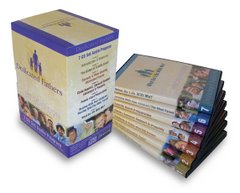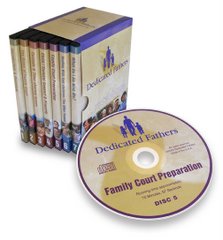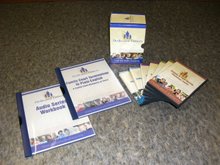
ALLEGATIONS OF SPOUSAL ABUSE
Divorce, child custody, and the family court system
www.dedicatedfathers.org
www.unitedfathers.org
By: Marvin L. Chapman
In family court (divorce court), the definition of spousal abuse is fleeting at best. For over 25 years I have observed spousal abuse as being any time a parent “feels” uncomfortable or “threatened.” This is to say in family court, spousal abuse is the act of making the other party “feel.” Sounds funny? Absurd? Well, go to your local family law courthouse and find out where divorce and spousal abuse cases are being heard and then watch in amazement as you see the stories unfold.
Generally, all a woman has to say is she is in “fear” of the father and a restraining order is immediately placed against the father - no proof, no validation, no verification, no police reports, nothing is required other than “feeling fearful.”
Fact: 1 in 3 women (33%) and 1 in 4 men (25%) will be victims of domestic violence. With such statistics, it makes you wonder why so many women and yet so few men are able to obtain restraining orders for domestic violence. Could it be the institutional bias against fathers is so great in family law that judges just can’t or won’t believe men can be victims of abuse from women? Go to the courthouse, watch what goes on, make up your own mind.
In family court, the mere allegation of being “fearful” of the father will typically get the mother a three (3) year restraining order against the father. Additionally, many cases end up with the father being ordered to parenting classes (money) anger management classes (more money), supervised visitation with their children (even more money) and a higher child support order (much more money). Ever wonder why men feel all they are is a paycheck? Read this paragraph again and see if you can figure out why we feel that way.
In California, part of the formula for determining child support is the amount of time each parent spends with their children. Accordingly, if a mother makes a false allegation of being “fearful” and can get the court to order supervised visitation with the father - she just won the child support lottery. Therefore, mothers in California have a financially vested interest in making false spousal abuse allegations. And this is our divorce system at work.
I have had clients whose spousal abuse cases against them have been thrown out by the District Attorney (DA) as unsubstantiated and/or unfounded, only to have the mother go to family court and get a three (3) year restraining order against the father based on the same allegation which was found to be unsubstantiated and/or unfounded by the DA.
I have had clients who have pleaded with the court to allow them to take lie detector tests to prove their innocence, only to be turned down by the family court judge because the judge had already made up their mind that the father was guilty.
I have had many cases where the father can prove he was at work when the mother was “injured.” However, because the mother had a bruise, the court takes the mother’s word for it and grants a three (3) year restraining order. In many of these cases the mother is so proud of what she pulled off in court that they call the father and laughingly brag to him on how she learned to bang herself into a door jam to get a bruise. For this act, the father is given limited time with child children, pays for anger management courses, pays for a monitor to supervise his visits with his children, and pays a higher child support amount due to the limited amount of time he has with his children.
This is JUSTICE - Family Court Style
Again, in family court, only allegations are necessary - no proof is required, no validation and no verification is necessary for a family court judge to tell truth from fiction in less than 10 minutes. It hurts to admit it but as a trained therapist with over 25 years of experience, without any proof, validation or verification, I am many times unable to tell truth from fiction - no matter how many times I meet with a couple. Yet, in family court, a judge - with no psychological training or experience - can determine truth from fiction in less than 10 minutes.
What a world this would be if we all could be like family court judges and have such powerful insight into human behavior, family functioning and family dynamics that we are able to determine absolute truth within any particular family almost immediately!
Since the mere allegation of spousal abuse makes you guilty, even when totally lacking in proof, validation, verification or evidence, there is no absolute way to protect yourself from these false charges. However, to minimize your chances of being falsely accused make sure you do not in any way provoke a verbal altercation with the other parent. Walk away, go to a hotel, do anything, but do not get into a verbal altercation with the other parent. The next step of an escalating verbal altercation is false allegations of abuse.
I know many readers of this section may have very strong feelings about these issues. As I tell many of my own clients, “Don’t believe me, believe your own eyes and ears.” Go to your nearest family court and watch the divorce and domestic violence hearings. If possible, talk to both the fathers and the mothers involved. Determine truth for yourself.
IMPORTANT DIFFERENCES IN ABUSE ALLEGATIONS
Allegations of spousal abuse (domestic violence) within family court is not the same as allegations of spousal abuse outside family court. Within family court there are emotional battles over the children, hurt feelings, divorce issues, perceived wrongs, financial incentives, and other issues which drive the desire to punish the other parent through false allegations. Other than judges, those involved in family court know the vast majority of claims of spousal abuse within family court are simply false allegations - without any factual foundation whatsoever. Outside of family court, there are few rewards for making false allegations. Accordingly, the vast majority of claims of spousal abuse outside of family court are based on fact with substantial factual foundations.
“FAMILY COURT IS FAMILY ABUSE”
Marvin Chapman, the author of this article, has a great website devoted to fathers rights and divorce information. Why not take a look?
www.dedicatedfathers.org
www.unitedfathers.org
Dedicated Fathers is the ultimate tool to help you defend your rights!
Tuesday, March 27, 2007
ALLEGATIONS OF SPOUSAL ABUSE (Divorce and the Family Court System)
Posted by
Dedicated Father
at
7:53 PM
56
comments
![]()
Labels: abuse, child custody, child support, children, collaborative divorce, court case, divorce, divorce coach, domestic violence, family court, fathers rights, spousal abuse
Ten Things to do for Yourself This Year

Ten Things to do for Yourself This Year
1. Learn to love yourself. You are just as deserving of your love and respect as anyone else is. When you learn to love yourself, you treat yourself better because you know that you are worthy of it.
2. Realize that you deserve only the best that life has to offer. When you know that you deserve the best, you’ll go out and create the best for yourself.
3. Set a goal for yourself and then do what you need to do to reach it. No matter how small the goal, reaching it will make you feel very good about yourself.
4. Learn a new skill. Learning is how we grow and assure ourselves that we are alive and capable.
5. Take time just for yourself every day. Even 15 minutes a day is enough to re-charge your battery. This is not selfish; it is self-preservation.
6. Do something creative. Find a hobby that you enjoy and just do it. Creativity just feels good.
7. Tell the people that you care about how you feel. Never pass up the chance to tell someone that you love him or her. This way, you will feel the pain of regret.
8. Let go of the past. It is gone forever. Learning to live in the here and now is invaluable in making every day the best.
9. Let go of one grievance or prejudice. We all have them, and they are just black holes on our soul.
10. Laugh every single day. One good belly laugh is healing. If you can’t see anything to laugh at, you aren’t looking hard enough.
www.dedicatedfathers.org
www.unitedfathers.org
Get what every father needs to know. Order Dedicated Fathers today!
Posted by
Dedicated Father
at
7:33 PM
4
comments
![]()
Labels: child custody, child support, children, collaborative divorce, counseling, court case, divorce, family court, guidance, self improvement
Monday, March 19, 2007
QUOTES AND SAYINGS FOR A MORE POSITIVE OUTLOOK

QUOTES AND SAYINGS FOR A MORE POSITIVE OUTLOOK
The following is a list of quotes and sayings that can and will positively effect your future. By changing your thinking you can change your life.
www.dedicatedfathers.org
• Not all who wander are lost.
• Success is getting up one more time than you fall down.
• Don’t trouble trouble, until trouble troubles you.
• “The best way to destroy an enemy is to make him you friend”--Abraham Lincoln
• If you plant a tree, don’t keep pulling it up by the roots to see how it’s growing.
• Adversity tempers the spirit.
• Doing the right thing requires courage.
• Your Choice: Victim or Victor.
• Surround yourself with the precious few who believe in you.
• Winning like losing, is a choice
• Belief in yourself far outweighs the doubts of others.
• Recipe for life–someone to love, something to do and something to look forward to.
• Live in harmony with your highest values and your innermost convictions. Never compromise.
• You must become the person you want to be on the inside before you see the appearance of this person on the outside.
• Develop a benevolent world view; look for the good in the people and circumstances around you.
• If you conduct yourself as though you expect to be successful and happy, you will seldom be disappointed.
• “Do what you can, with what you have, right where you are”--Theodore Roosevelt.
• Circumstances do not make the man; they merely reveal him to himself.
• It is when you finally learn that your fears are all in your mind that your life begins.
• Your outer world is a reflection of your inner world.
• Failure is merely another opportunity to more intelligently begin again.
• You are surrounded right now by unlimited opportunities disguised as insurmountable problems.
• “When a man begins to realize the truth about himself, it lessens his desire to reform his neighbors.”--Mark Twain
• Faith is to believe what we do not see, and the reward of the faith is to see what we believe.
Visualize success. Picture yourself succeeding. You will succeed.
Posted By: Dedicated Fathers
For more information and guidance on divorce and child custody please visit www.dedicatedfathers.org & www.unitedfathers.org
Thank you
Posted by
Dedicated Father
at
11:59 AM
48
comments
![]()
Labels: attorneys, child custody, children, counseling, divorce, divorce coach, fathers rights, legal, mediation, personal growth
Collaborative Divorce vs. Adversarial Divorce: A new outlook
COLLABORATIVE DIVORCE
Collaborative Divorce vs Adversarial Divorce
A Positive Outlook
By:Marvin Chapman
www.dedicatedfathers.org
1. Collaborative divorce is a process involving family law attorneys, mental health professionals and financial specialists, all working together cooperatively to bring about a solution that is fair, just and equitable for all family members. Each of the professionals on the team assist both husband and wife to make informed decisions in an atmosphere of respect and fairness. Without the judge to make the orders, the divorcing couple is empowered to make their own informed decisions with the advice and guidance of their professional team.
2. The husband and wife control the pace of their divorce and the decisions being made.
3. The husband and wife receive advice and guidance from a team of professionals, who will not only help them through the current divorce process, but enrich their future lives as well.
4. The children have a voice without fear of what they say being used against one of their parents in court.
5. Compared to the cost of the traditional adversarial litigation method, the cost of the collaborative divorce process can be much less expensive.
6. Dissolving a marriage collaboratively encourages respect and a continuing civil relationship between husband and wife, which is paramount when children are involved.
7. Some of the key benefits of the collaborative divorce process are the following:
A. Mutually created resolutions;
B. Mutually satisfying resolutions;
C. Durable agreements;
D. New tools for effective problem-solving in the future, such as co-parenting issues;
E. Provides other professional resources to smooth transitions; and
F. Provides a safe environment for difficult conversations.
8. In the collaborative divorce model, the parents are able to maximize their financial resources because of the following:
A. Focus and time are spent on resolving problems and creating solutions, not creating more problems through numerous court appearances;
B. The expertise of each team member is brought to bear on creating family solutions;
C. Emotional issues which can inhibit the divorce process are addressed;
D. Working collaboratively and using one neutral financial professional saves time, provides focus and frames financial issues for the parties’ team to solve problems;
E. The process allows all parties to talk with one another to prevent costly, time consuming misunderstandings and additional litigation;
F. The attorneys act as guides through the process, educating their clients regarding the law, instead of taking an advocacy position and then fighting it out in court; and
G. The attorneys and coaches assist the clients in looking to future long-term goals for themselves and their children, in place of setting the client up for more hearings in the future.
The collaborative process generally gives both parents the following:
A. Peace of mind, reduced anxiety;
B. Security and privacy;
C. Less conflicts in the future;
D. More control of the outcome; and
E. Knowing you did the right thing and the best you could do for your children
BY:Marvin Chapman
Marvin Chapman, the autor of this article, has a great website devoted to divorce help and fathers rights. Why not take a look?www.dedicatedfathers.org
www.unitedfathers.org
Join the Dedicated Fathers Yahoo Discusssion Group!
Posted by
Dedicated Father
at
11:49 AM
5
comments
![]()
Labels: attorneys, child custody, children, collaborative divorce, court case, divorce, divorce coach, family court, fathers rights, law
Tuesday, March 13, 2007
Collaborative Divorce - options

COLLABORATIVE DIVORCE
A Non-Adversarial Option
www.dedicatedfathers.org
www.unitedfathers.org
A new non-adversarial divorce process is sweeping the country. This new paradigm is known as collaborative divorce. Collaborative divorce is a process involving family law attorneys, mental health professionals and financial specialists, all working together cooperatively to bring about a solution that is fair, just and equitable for all family members.
Collaborative divorce is an out-of-court process that assists husbands and wives to dissolve their marriage in a compassionate, practical and informed way, while proceeding at their own pace - not based on the court’s schedule.
Collaborative divorce is a process that supports the entire family and provides for a smooth transition for all family members.
The collaborative divorce method puts together a professional team for each couple who agree to use the process. Just as in the traditional adversarial process, both husband and wife choose an attorney to represent them; however, these attorneys have been specially-trained in the collaborative process. Joining the team are two or three mental health professionals, one of whom is retained by each spouse as their coach, and one who is hired as the child specialist - serving as the voice of the children. Rounding off the team (if needed) is the financial specialist, who is a certified financial planner, or in some cases a certified public accountant. The attorneys, mental health professionals and financial specialists have received specialized training in the collaborative divorce process.
In the traditional adversarial method, many parents use the process as a therapeutic tool to heal or sooth their pain, to justify their actions, or to seek vindication for the perceived “wrong” of the other parent, all of which become powerful emotional weapons to be used to “win at all costs” - and cost it does, a lot, both emotionally and financially.
In the collaborative process, instead of paying their attorneys to conduct research, discovery and trial preparation to “battle” the other spouse, the parties spend their money on resolving the issues constructively and fairly with the cooperative assistance of their attorneys and other team members. The team is not only committed to keep the parties out of court, they are also there to help the husband and wife transition their marriage into two households in a peaceful, intelligent and restorative manner. Therefore, rather than spending the parties’ resources in numerous court appearances, which have the potential to embitter spouses to exaggerate and exacerbate their differences, the collaborative approach is much less expensive and much less stressful.
The inclusion of the education and information team approach promotes positive healing for all family members, which provides the parties with the opportunity to make the most informed and creative decisions regarding their children. It allows the parties to make intelligent informed decisions regarding the division of their property and the distribution of future support, which will affect the financial future of all family members.
Collaborative divorce is a process which puts the parties directly in charge of their own affairs, a process not typically available under the traditional adversarial method. The adversarial process pits the two attorneys against each other. Then the judge, with no prior knowledge of the family or family dynamics, will make a decision which will affect the entire family for the rest of their lives.
In the collaborative model, power and control is maintained by the family, benefitting all family members by taking into account the uniqueness of each family member.
BY: Marvin Chapman & Dedicated Fathers
Marvin Chapman is a Certified Collaborative Divorce Coach
Order Dedicated Fathers Today!
www.dedicatedfathers.org
Posted by
Dedicated Father
at
6:23 PM
1 comments
![]()
Labels: attorneys, child custody, child support, collaborative divorce, divorce, divorce coach, fathers rights, kids, legal
Monday, March 5, 2007
Divorce Coach - Divorce coaching vs. Individual therapy
COLLABORATIVE DIVORCE COACHING
vs
INDIVIDUAL THERAPY
Marvin L. Chapman, MFT, CFC
Licensed Marriage and Family Therapist, MFC27081
Clinical Forensic Counselor, F16841
Certified Collaborative Divorce Coach
marvin@unitedfathers.org
www.unitedfathers.org
www.dedicatedfathers.org
Many people wonder what the difference is between a mental health professional
providing divorce coaching and a mental health professional providing
individual therapy.
Simply put: The major difference between divorce coaching and individual therapy
is the client, not the coaching or the therapeutic process.
Traditionally, individual therapy involves the assumption that the client is coming into therapy due to some real or perceived “problem” which they want to understand,
discover or have “treatment” thereon because their coping skills and/or current
manner of dealing with their “problem” is not working for them. Due to this
traditional thinking, it has long been a given that if someone is in therapy, something is “wrong” with them. Insurance companies and managed care facilities have
traditionally indicated a more comfortable position in dealing with emotional
“problems” from the medical model.
Simplified, the medical model says there is a disease (the problem), the symptoms
must be documented (a diagnoses from the DSM, yet another medical model),and a plan is laid out as to how the client will be “healed” (from the clinician’s
therapeutic orientation, paradigm or model). Based on this medical model, the
therapist will focus on the client’s history to assist in determining how the
“disease” (the problem) came about.
Many times you will hear therapists talk about the “pathology” of a client.
Ever wonder what “pathology” really means? (Definition: “The science or
Doctrine of diseases. That part of medicine which explains the nature of diseases,
their causes and their symptoms.” As you can see from the definition,
even in their diction, therapists use the medical model.)
With an understanding of the “pathology” the therapist can allegedly determine the
cause of the problem (the diagnosis). The therapist then gives the client new ways of
thinking, coping or behaving that allegedly will work better for them in the future
(the healing or curing of the problem). Under this simplified model, the therapist is the empowered helping agent; the client is the one with the “problem.”
Divorce coaching is different from individual therapy. In coaching, the client is not perceived as having any particular “problem” and the divorce coach does not
assume any “pathology.” Problems and/or pathological issues are only
dealt with if they impede the divorce process, wherein a suggestion may be
given that the client might benefit from therapy with an outside independent therapist.
In coaching, the therapist joins with the client in a duet of cooperation. The coach, having a therapeutic and mediation background, educates, offers insights and
observations, gives possibilities, and, at times, may even propose certain strategies
for the client to consider.
The divorce coach is specifically trained in the collaborative process to work closely with the client in their development of skills needed to deal with critical issues involving the divorce. Although coaching may be very therapeutic, it is not therapy.
The divorce process, whether adversarial or collaborative, is a complex and deeply
emotional process. Grief issues, such as denial, anger, bargaining and depression are usually involved, as well as a sense of loss and, many times, confusion.
Post relationship co-parenting issues are always a difficult area, as are support
and property issues. Individual parenting styles is also an area of concern for
many parents (How do I answer my kids’ questions? How do I or should I discipline
the kids who are already hurting?). Divorce coaches in the collaborative model
not only have specialized training of the collaborative process, they are also
generally very experienced in working with restructuring families.
As indicated above, the major difference between divorce coaching and
individual therapy is the client (not the coaching or therapeutic process).
In therapy, the client is perceived as having a “problem” with a particular
“pathology” for which the client is seeking help. In divorce coaching,
the client is not perceived as having any particular “problem”, and the
divorce coach does not assume any “pathology.” The divorce coach uses
their training and experience to assist their client through the collaborative divorce process in such a way that the client is able to move on with their life with the learned skills and knowledge needed to make their post divorce life as full and complete as possible.
BY: Marvin L. Chapman
www.unitedfathers.org
www.dedicatedfathers.org
Put Marvin's experience to work for you!
Order Dedicated Fathers Today!
Posted by
Dedicated Father
at
7:12 PM
32
comments
![]()
Labels: child custody, child support, collaborative divorce, court case, dads, divorce, divorce coach, divorce mediation, divorced dads, family court, fathers rights, law, legal, mediation












